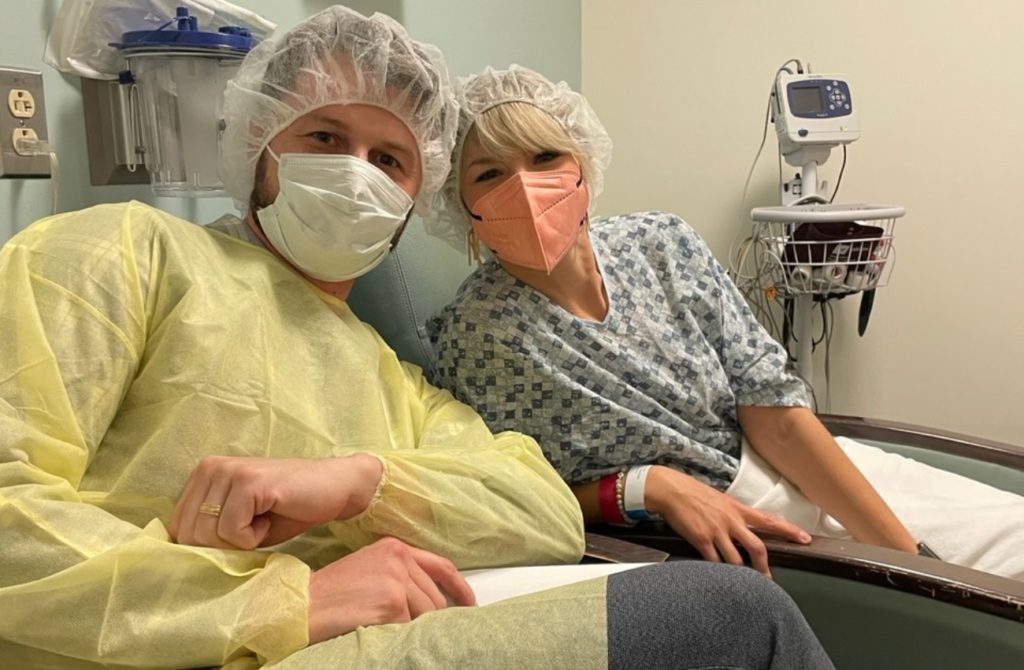Considering Surrogacy? Let’s Demystify the Process
Surrogates, intended parents, fertility clinics, and lawyers. Contracts, cycle calendars, and money! How does surrogacy work and how do all these pieces go together? What is the role of a surrogacy agency? As you hear more and more about surrogacy, some of these questions may have

What is Surrogacy
When people talk about surrogacy, they’re generally referring to gestational surrogacy. The Intended Parents work with a surrogate/gestational carrier who becomes pregnant using embryos created via IVF. The surrogate has no genetic relationship to the baby. Or to quote Baby Sinclair from the 90’s show Dinosaurs, “Not da mama!”
The Role of a Surrogacy Agency
Intended parents often work with a surrogacy agency like the Surrogacy Center of Philadelphia to find a suitable surrogate to carry their baby as well as manage all the legal, medical, and financial details from embryo transfer to delivery. Surrogates undergo an extensive evaluation to ensure that they are physically and emotionally prepared for a surrogacy journey. Both the intended parents and surrogates discuss their expectations of the surrogacy process with the agency.
Getting Matched with Intended Parents
There are two sets of criteria that are generally used for matching. One set relates to legal and medical preferences. For instance, consent to transfer a single embryo vs. double embryos or COVID-19 vaccination status. The second set of criteria is softer. Agencies like the Surrogacy Center of Philadelphia will also look closely at personalities and which parents would fit well with particular surrogates. It is a lot like matchmaking!
Both sides have profiles that are given to the other party to review. If everyone is happy to proceed further, then the agency will facilitate a meet up. It is important that everyone is very open with each other and also take their time about this decision. You should never feel pressured to rush into a surrogacy arrangement.
Contracts, Contracts, Contracts
The Intended Parents and Surrogate enter a contract with each other called the Gestational Carrier Agreement (GCA). This contract clearly outlines the expectation of all parties in this process, as well as financial obligations. How many embryos will be transferred, how many attempts will be made, how much should the surrogate get for carrying the baby and when are those payments made, who takes custody of the baby in the event that the Intended Parents have died, who pays for insurance, the list goes on and on.
As you can see, this is a super complicated contract. As such, everyone must have their own attorney and you should only work with an experienced experienced Assisted Reproductive Technology lawyer.
Payment for the Surrogate
How much does a surrogate get paid? If you google it, you’ll find all kinds of numbers. That’s because the demand for surrogates is sky-high. A lot of agencies are dangling some big numbers. It’s important to recognize that surrogacy is not a regular job. You will get allowances for certain steps, but the biggest portion of your compensation is called “base” and this is not guaranteed, as it only starts once you become pregnant. The average success rate for a surrogacy embryo transfer is around 60%. So your primary motivation shouldn’t be financial if you’re considering surrogacy.
That being said, you should be fairly compensated. Compensated varies by region, insurance status, pregnancy history and risk levels, experience as a prior surrogate, etc. Going with the highest base compensation may not always be the wisest choice. It’s important to think about intangibles too. What kind of support are you receiving from the agency? What kind of Intended Parents are you helping?

Getting Pregnant Through an Embryo Transfer Cycle
Once contracts are done, surrogates can go into the fertility clinic for what is called cycling. There are several outstanding clinics in the Greater Philadelphia area, so if you’re considering being a gestational carrier, you won’t have to travel far for cycling.
The process can take 6-8 weeks depending on the protocol. There are many appointments for blood work and ultrasounds. Everything is timed carefully. Gestational carriers begin to take hormones and other supportive medications (prenatal vitamins, low dose aspirin, antibiotics). The clinic will keep track of the surrogate’s cycle and other physical signs of readiness for the transfer.
Pregnancy Confirmation
At 7 and 10 days post-transfer, the surrogate takes two blood tests to confirm pregnancy. Medications will continue for several more weeks, as they support the body as it gets comfortable with its newest resident. A fetal heart rate is then confirmed 4-6 weeks later! Once the fetal heart rate is confirmed, the surrogate begins to receive larger compensation payments. The base compensation is divided over 8 months to follow along with the pregnancy.
Managing the Pregnancy and Preparing for Delivery
Once a fetal heart rate is confirmed, the surrogate will continue her care at her normal obstetrician. Intended Parents are welcome and encouraged to attend appointments.
About midway through the pregnancy, the Intended Parents complete their parentage work. In Pennsylvania and New Jersey, you can get a pre-birth order, which means that the court reaffirms the Intended Parents as the sole legal parents of the baby before the baby makes its arrival. This also means that the Intended Parents names are on the birth certificate printed by vital records, not the surrogate.
In addition to getting the parentage work done, you want to create a birth plan. Your agency should help put together a collaborative document that respects the wishes of the laboring surrogate while also honoring how special this day is for Intended Parents. This birth plan is then provided to the hospital staff.
Making It Across the Finish Line
There will be a whole team supporting both the Surrogate and Intended Parents on delivery day. Not only the doctors and nurses, but social workers, patient administration, and the financial office. It is very important that the agency helps streamline communications and paperwork, and advocate for everyone’s needs.
The Surrogacy Center of Philadelphia has a close working relationship with delivery hospitals and birth centers in the Great Philadelphia area. A surrogate should never worry about the quality of care they receive. Nor should Intended Parents worry about having access to and being able to care for their long-awaited baby.
Surrogates often go home within 24 hours for a vaginal delivery, but can stay longer in the event of a cesarean delivery or if complications arise. Similarly, the baby will be discharged with their parents a day or two after birth.
However, there’s more to the conclusion of a surrogacy journey than the birth and the legal paperwork. There are a lot of emotions. Being without your belly buddy can be challenging for surrogates, so an experienced agency like the Surrogacy Center of Philadelphia will be in close contact with surrogates post-delivery making sure they are physically and emotionally doing well.
Concluding Thoughts
Surrogacy is an incredibly rewarding, but complex experience. It is important to have an experienced surrogacy agency like the Surrogacy Center of Philadelphia to guide you through the surrogacy process. If you are considering becoming a surrogate, please visit https://www.philadelphiasurrogates.com/surrogates/.
If you would like more information about building your family through surrogacy, please visit https://www.philadelphiasurrogates.com/intended-parents.





